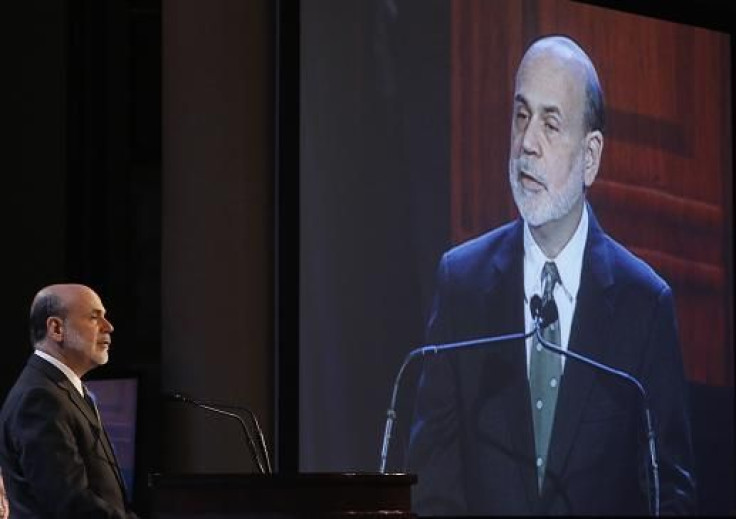Bernanke Claims He Can Use His Awesome Mind Powers To Make Banks Lend

The media and various financial analysts gave Federal Reserve Chairman Ben Bernanke high marks Tuesday for delivering a wide-ranging speech on what exactly ails the U.S. economy. The Washington Post lauded Bernanke's clarity, noting the speech "left no doubt" as to what lawmakers needed to do to keep the recovery going, while The Wall Street Journal focused on his honesty regarding the Fed's potential limits. Business Insider called it "excellent."
But even though the financial media was tuned in, it seems all missed the most crucial part of Bernanke's appearance: the one where he claimed to have awesome mind powers that could force the banking sector to do his bidding.
To give credit where due, the top U.S. central banker did give a lucid reading of what’s holding back a robust recovery, and of what needs to be done in most cases.
The Fed head, speaking in Midtown Manhattan to the Economic Club of New York, went through all the post-recession “headwinds” the central bank has been discussing over the past year or so. The effect of state and local budget cuts on household finance, the increased level of uncertainty due to developments in Europe and Washington, and the extreme risk aversion by investment firms all were noted. The depressed state of the housing market and the overly tight standards banks seem to have adopted in spite of Fed inducements to the contrary also made the chairman's list.
In fact, Bernanke was emphatic on the last point, noting “lenders have maintained tight terms and condition on mortgage loans, even for potential borrowers with relatively good credit,” and saying there was no good reason for the banks to be doing so.
“While some tightening of the terms of mortgage credit was certainly an appropriate response to the earlier excesses, the pendulum appears to have swung too far, restraining the pace of recovery in the housing sector,” Bernanke explained.
But while Bernanke made a convincing case that, essentially, the banks are holding us back, he sputtered and equivocated in trying to explain what the Fed could do about it, and offered only a scattershot answer as to why the central bank hasn’t done much.
In response to a post-speech question by Harvard economist Martin Feldstein, who asked what tools the Fed had used to make the banks loosen lending standards, Bernanke said the Fed’s loose monetary policy could be counted as such a tool, since it allowed the banks to arbitrage the low-interest-rate environment and make record profits, something that eventually would lead financiers to lend.
“As the profitability of mortgage lending goes up [due to the low interest banks can borrow at], we will see banks” begin to ease lending standards, Bernanke explained.
Bernanke, perhaps realizing the optics of having just justified making bankers rich so that, maybe, eventually, they’ll do their part in helping the rest of the economy out, then added the Fed had “regulatory, supervisory, and analytical” capabilities that it had deployed to tackle the issue.
He suggested, for example, that the Fed had used its supervisory and regulatory power over the banking industry “at the margins” to help the housing market, giving as an example cases where the Fed ostensibly steered banks to execute short sales rather than foreclosures on distressed mortgage debt.
But seemingly unconvinced by his own answer, Bernanke fell back to emphasizing his secret weapon: an awe-inspiring brain. Repeating several times that this tool was not to be underestimated, Bernanke said that while not necessarily directly addressing the issue, the Fed “had a lot of influence from the analytical, intellectual point of view.”
“We’ve been influential in talking to other agencies, talking to the Congress in providing ideas and approaches,” Bernanke said.
To summarize for those who weren’t keeping track: The world’s most powerful central banker said Tuesday the banks weren’t supporting the economic recovery, even though there was no justification for that. Then, asked why he didn’t just force the banks to lend, he said the central bank was doing just that, drowning finance in so much free cash that the banks would eventually have to say "Uncle!" And when that didn’t sound quite right, he went back and said that behind the scenes, the Fed was using “intellectual” power to force the banks’ hand. Finally, just in case anyone was wondering if they'd just walked into an alternate reality, he then used the words “ideas” and “Congress” in the same sentence.
Bernanke said this in a room with hundreds of economists, financiers, businessmen and pundits present. Not a single person said a thing.
© Copyright IBTimes 2024. All rights reserved.











